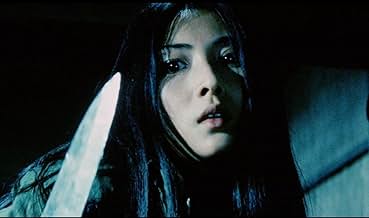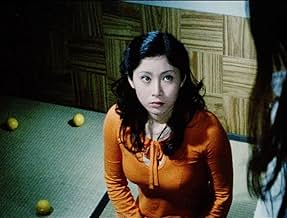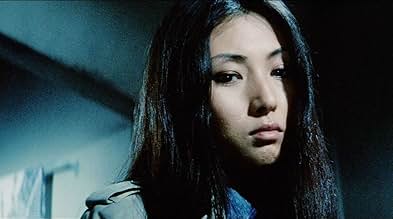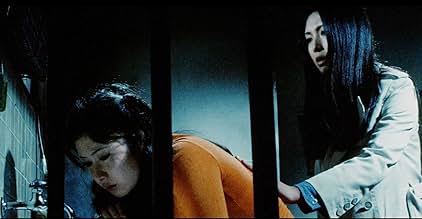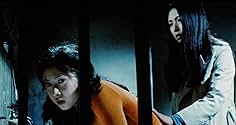CALIFICACIÓN DE IMDb
7.0/10
2.3 k
TU CALIFICACIÓN
Agrega una trama en tu idiomaMatsu is sheltered by an incestuous prostitute on her run from the police, her ex-prison mate and a cop whose arm she hacked off.Matsu is sheltered by an incestuous prostitute on her run from the police, her ex-prison mate and a cop whose arm she hacked off.Matsu is sheltered by an incestuous prostitute on her run from the police, her ex-prison mate and a cop whose arm she hacked off.
- Dirección
- Guionistas
- Elenco
- Dirección
- Guionistas
- Todo el elenco y el equipo
- Producción, taquilla y más en IMDbPro
Opiniones destacadas
The original Female Convict Scorpion is an all time masterpiece. The first sequel, Jailhouse 41, was not quite as good in my opinion, though it's still notable for the fact that it took the idea from the original and created something in a completely different style. Director Shunya Ito has managed to do the same thing again with this film; the story is a bit different here, but still he's managed to take what made the previous entries excellent and better than many films of this type and craft something fairly original around it. Again the action focuses on Nami Matsushima (a.k.a. "Scorpion") and this time she's out of the jailhouse and not too keen on the idea of going back. After escaping from pursuing police officers, one thing leads to another and Scorpion finds herself getting it together with a prostitute and her retarded brother. The prostitute ends up getting impregnated by the retarded brother (...), while Scorpion is kidnapped and caged up by someone who she made an enemy out of in prison. But Scorpion doesn't like spending time behind bars and it's not long before she's back to doing what she does best.
The film gets off to a great start as we see Scorpion hack the arm off a copper intent on taking her back to jail. From there, however, the film slows down a lot and Beast Stable ends up being more of a drama than the previous two films. That's not to say that there isn't still plenty of action - Scorpion still spends a lot of time in 'revenge mode' and the film isn't exactly short on general sleaze. Meiko Kaji once again reprises her role as the sinister title character and it's another understated, almost wordless performance. Her screen presence is great, however and she manages to have a menacing presence despite being only small physically. The plot structure for this film is similar to the other two in that it all builds into a crescendo of revenge. There are more people who have angered Scorpion in this film than in the previous two so this section takes up a fairly large part of the film. There's a few surreal sequences, not as many as in the first film and nowhere near as in the second, but the film stays in with the rest of the series on that point. Overall, I would say this film is between the first two in terms of quality - not as great as the original and slightly better than the second.
The film gets off to a great start as we see Scorpion hack the arm off a copper intent on taking her back to jail. From there, however, the film slows down a lot and Beast Stable ends up being more of a drama than the previous two films. That's not to say that there isn't still plenty of action - Scorpion still spends a lot of time in 'revenge mode' and the film isn't exactly short on general sleaze. Meiko Kaji once again reprises her role as the sinister title character and it's another understated, almost wordless performance. Her screen presence is great, however and she manages to have a menacing presence despite being only small physically. The plot structure for this film is similar to the other two in that it all builds into a crescendo of revenge. There are more people who have angered Scorpion in this film than in the previous two so this section takes up a fairly large part of the film. There's a few surreal sequences, not as many as in the first film and nowhere near as in the second, but the film stays in with the rest of the series on that point. Overall, I would say this film is between the first two in terms of quality - not as great as the original and slightly better than the second.
After finishing the Zero Woman series, I was looking forward to the Female Prisoner Scorpion series; both based upon comics by Tooru Shinohara. Unfortunately, I was not able to see them in order, as this is the third in the series.
It starts great as The Scorpion (Meiko Kaji) is escaping from the police. Detective Kondo (Mikio Narita) did manage to get a cuff on her, but she proceeded to cut off his arm and get away. If that isn't bad enough, later on a dog digs up the arm and is seen trotting down the street before finding a place to enjoy his treat.
Scorpion might as well go back to prison as life is no picnic on the outside. First, a local Yakuza Tanida (v) threatens to put her back if she doesn't put out; and then the gang leader gets her when she gets rid of Tanida. But, they don't hold her for long before she escapes and is looking for vengeance.
Soon they are dropping like flies. Some certainly deserved it for wearing garish outfits with shirt collars so big they went all the way to the shoulder. The madam (Reisen Lee) turns herself in to avoid getting killed.
The police arrive at her latest kill and trap her in the sewer. She's in there for a week and the cops find out that a friend (Yayoi Watanabe) has been supplying her with food. (The story O Yuki (Watanabe) and her brother is a subplot that is very interesting, but only incidental to the movie.) They try to burn her out, but this is The Scorpion, and she has some unfinished business.
Not the usual mix of sex and violence, this is a slow tale that is beautiful throughout.
It starts great as The Scorpion (Meiko Kaji) is escaping from the police. Detective Kondo (Mikio Narita) did manage to get a cuff on her, but she proceeded to cut off his arm and get away. If that isn't bad enough, later on a dog digs up the arm and is seen trotting down the street before finding a place to enjoy his treat.
Scorpion might as well go back to prison as life is no picnic on the outside. First, a local Yakuza Tanida (v) threatens to put her back if she doesn't put out; and then the gang leader gets her when she gets rid of Tanida. But, they don't hold her for long before she escapes and is looking for vengeance.
Soon they are dropping like flies. Some certainly deserved it for wearing garish outfits with shirt collars so big they went all the way to the shoulder. The madam (Reisen Lee) turns herself in to avoid getting killed.
The police arrive at her latest kill and trap her in the sewer. She's in there for a week and the cops find out that a friend (Yayoi Watanabe) has been supplying her with food. (The story O Yuki (Watanabe) and her brother is a subplot that is very interesting, but only incidental to the movie.) They try to burn her out, but this is The Scorpion, and she has some unfinished business.
Not the usual mix of sex and violence, this is a slow tale that is beautiful throughout.
This is Shunya Ito's final entry in the FEMALE CONVICT SCORPION series, starring the great Meiko Kaji. The series, based on a Japanese manga, follows the exploits of a woman unjustly imprisoned, brutalized by guards and fellow inmates, who defends herself with such aplomb, she becomes a jail-house legend. The other convicts nickname her Sasori, which means Scorpion. Over the course of two films, she escapes to wreak vengeance against the man who got her busted, is sent back for his murder, and escapes again; the second film ends with Sasori on the loose.
This, the third film, focuses on Sasori's life as a fugitive outside the walls. In an eye-opening first scene, Sasori evades detectives on a subway train; she comes out of it handcuffed to one of the detectives' arms, but not the rest of him. She flees to a slum which consists of a red-light district run by a forced-prostitution ring and a residential area made up of a mud street and shacks, where she is put up for the night and befriended by a lonely prostitute named Yuki. We soon discover that Yuki gives of herself on a nightly basis to her brain-damaged brother, who she keeps locked in a closet. Sasori tries to lead a normal life, taking a job as a seamstress and renting her own apartment, but she and Yuki soon meet again and are both embroiled in a plot that involves the Cruella De Ville-from-hell madam who runs the prostitution ring and the detective from the subway (Mikio Narita, a regular in Kinji Fukasaku films), who by God wants his arm back.
What follows is an atmospheric noir/horror yarn--it takes elements from both and uses them well--that applies Ito's flair for the visual to a mood that is different from the first two SCORPION films, yet bears the same unmistakable signature. A scene involving lit matches falling into a sewer tunnel is especially beautiful. Ito's use of sound, like when Sasori is incessantly scraping the handcuffs with the arm against a tombstone in an attempt to free herself, is as effective here as ever. He also employs silence more than usual, as if by virtue of a newly honed minimalism. This goes along with the relatively subdued tone of the first section of the film, which allows space to explore Sasori's and others' characters. Things pick up by the end, though it's all handled with a dreamier rhythm than the previous films. This is an asset. Each of the three films has its own style, I realize now, and seeing this one made me go back and watch the first, appreciating it more than before.
Meiko Kaji gives her usual amazing performance as Sasori, emoting silently, standing or moving or pouncing or maiming with a grace that switches seamlessly between human and animal. The pathos present in all three films is largely due to the human side of this grace, which never inhibits the films' darker aspects. Reportedly, Kaji, who did one more SCORPION film after this one, had as much to do with developing the character for film as Ito, not only in her performances, but off-camera as well. This film is a worthy swan song for the collaboration. Very Japanese, very seventies, very much something else entirely.
This, the third film, focuses on Sasori's life as a fugitive outside the walls. In an eye-opening first scene, Sasori evades detectives on a subway train; she comes out of it handcuffed to one of the detectives' arms, but not the rest of him. She flees to a slum which consists of a red-light district run by a forced-prostitution ring and a residential area made up of a mud street and shacks, where she is put up for the night and befriended by a lonely prostitute named Yuki. We soon discover that Yuki gives of herself on a nightly basis to her brain-damaged brother, who she keeps locked in a closet. Sasori tries to lead a normal life, taking a job as a seamstress and renting her own apartment, but she and Yuki soon meet again and are both embroiled in a plot that involves the Cruella De Ville-from-hell madam who runs the prostitution ring and the detective from the subway (Mikio Narita, a regular in Kinji Fukasaku films), who by God wants his arm back.
What follows is an atmospheric noir/horror yarn--it takes elements from both and uses them well--that applies Ito's flair for the visual to a mood that is different from the first two SCORPION films, yet bears the same unmistakable signature. A scene involving lit matches falling into a sewer tunnel is especially beautiful. Ito's use of sound, like when Sasori is incessantly scraping the handcuffs with the arm against a tombstone in an attempt to free herself, is as effective here as ever. He also employs silence more than usual, as if by virtue of a newly honed minimalism. This goes along with the relatively subdued tone of the first section of the film, which allows space to explore Sasori's and others' characters. Things pick up by the end, though it's all handled with a dreamier rhythm than the previous films. This is an asset. Each of the three films has its own style, I realize now, and seeing this one made me go back and watch the first, appreciating it more than before.
Meiko Kaji gives her usual amazing performance as Sasori, emoting silently, standing or moving or pouncing or maiming with a grace that switches seamlessly between human and animal. The pathos present in all three films is largely due to the human side of this grace, which never inhibits the films' darker aspects. Reportedly, Kaji, who did one more SCORPION film after this one, had as much to do with developing the character for film as Ito, not only in her performances, but off-camera as well. This film is a worthy swan song for the collaboration. Very Japanese, very seventies, very much something else entirely.
Since the past couple of days I'm really hooked on the "Female Scorpion" series and I keep hitting myself over the head because I waited until now which is way too long before purchasing the whole box set. "Beast Stable" is the third brilliant effort in a row, and the undeniably main trump of this series is how the writers always came up with something entirely new and different for each installment. Never before, or after, has there been an exploitation series that offered so much variety when it comes to story lines, settings, themes and filming styles. The original more or less qualified as a so-called "Women-in-Prison" flick (but already an atypical one), but you can't possibly categorize parts 2 and 3 as such, since they hardly feature any footage within prison walls. And the overall tone and atmosphere keeps changing with each new episode as well. The first film was harsh and gritty, whereas the second was psychedelic and part three is almost mainly melodramatic. Don't let this last description discourage you, however, as "Beast Stable" still features more than enough exploitative themes and disturbing footage in spite of the dramatic ambiance. The opening sequence, for example, is downright fantastic. Sasori, still a fugitive from the law, literally chops her way to freedom on the subway when there's no other possibility than to cut off the arm of the persistent policeman that handcuffed her. Her run through the city with the cut-off arm dangling on hers while the credits appear on screen, accompanied by the familiar theme song, is just pure and genuine exploitation gold! The story compellingly continues with our heroine desperately trying to lead an anonymous life in the big city, but the poor thing simply can't escape her past or even new types of agony. Sasori befriends a prostitute, though without exchanging dialog, and takes on a job in a sewing atelier. Her own retarded brother (!) impregnates the prostitute, while Sasori gets in trouble with the local pimping and underground crime network. She cleverly prevents a thug from taking advantage of her body, encounters a former enemy from prison and furiously avenges one of the prostitutes when she gets submitted to a barbaric abortion. Meanwhile, the one-armed cop continues to obsessively prowl the streets, looking for retribution against Sasori. Our multi-talented director Shunya Ito formidably criss-crosses all these story lines to a powerful wholesome and never once loses grip on the visual aspects or ingenious filming style. "Beast Stable" features some of the most impressive compositions and ingenious camera angles you can imagine, the editing is flawless and the exterior locations are effectively depressing. Those who know Sasori's character a bit are aware that the film seriously lacks memorable dialogs, but this always gets widely compensated with Meiko Kaji's wondrous on screen charisma and menacing grimaces. There's very little sleaze, apart from the aforementioned incestuous sub plot, but the brief flashes of extreme violence are terrific and the twisted ending is almost too brilliant for words. In fact, I think part three might just be the greatest (or at least, my favorite) one of the series so far. My only small and totally irrelevant point of criticism is regarding the ridiculous sounds one of the birds produces when Sasori is locked up in a cage. That bird sounds like a ventriloquist's dummy with stomach cramps.
The third film in a cycle of brilliant Exploitation movies, and the third masterpiece in a row, "Joshuu Sasori: Kemono-beya" aka. "Female Prisoner Scorpion: Beast Stable" (aka. "Sasori: Den Of The Beast" where I live) of 1973 is a film that differs from its predecessors in some aspects, but that keeps up the great quality. The entire original Sasori series with the wonderful Meiko Kaji stands out as the absolute highlight in WIP cinema, and all of the films, especially the first three, uniquely combine Exploitation and Art-house cinema like no other movie does. "Beast Stable" is the third, and second-to-last "Sasori" film with Meiko Kaji, the last one to be directed by genius director Shunya Ito and, in my opinion, the greatest of them all. The first film "Joshuu 701-gô: Sasori" of 1972 is an absolute masterpiece of Exploitation cinema and simply THE Definition of Exploitation-Art. In the equally brilliant first sequel, "Joshuu Sasori: Dai-41 zakkyo-bô" Ito added more surrealism and symbolism. The third "Sasori" film, "Beast Stable" keeps up the surrealism (allthough not quite to the same extent as the second), and features even more social criticism than its predecessors. Topics like poverty, forced prostitution and the exploitation of the poor are central themes of the movie.
This third "Sasori" film is ingenious and sublime in all aspects and arguably the greatest of the, generally brilliant, cycle (to me it's this one, with the first one as a close second). Once again, "Best Stable" is both very artistic and very Exploitation-like. The visually stunning film features an enormous amount of brutal violence and sleaze again, as well as sequences of enormous surrealistic beauty. The stunningly beautiful Meiko Kaji is once again brilliant in her role of Nami Matsushima (aka. Sasori). I absolutely worship this wonderful actress, and I'm sure I'm not the only one to do so. The rest of the performances are also great, especially Mikio Narita is great as a police Inspector who is obsessed with catching Sasori. The musical score is the same throughout all three films, with "Urami-Bushi", sung by Meiko Kaji herself, as the main theme, which is great, since the score is, simply put, pure perfection. As its predecessors, "Beast Stable" is a true gem and must-see for any fan of cult-cinema.
This third "Sasori" film is ingenious and sublime in all aspects and arguably the greatest of the, generally brilliant, cycle (to me it's this one, with the first one as a close second). Once again, "Best Stable" is both very artistic and very Exploitation-like. The visually stunning film features an enormous amount of brutal violence and sleaze again, as well as sequences of enormous surrealistic beauty. The stunningly beautiful Meiko Kaji is once again brilliant in her role of Nami Matsushima (aka. Sasori). I absolutely worship this wonderful actress, and I'm sure I'm not the only one to do so. The rest of the performances are also great, especially Mikio Narita is great as a police Inspector who is obsessed with catching Sasori. The musical score is the same throughout all three films, with "Urami-Bushi", sung by Meiko Kaji herself, as the main theme, which is great, since the score is, simply put, pure perfection. As its predecessors, "Beast Stable" is a true gem and must-see for any fan of cult-cinema.
¿Sabías que…?
- TriviaReferences ghost stories of old Japan on demon folklore; the story of Tsuna Watanabe battling a demon and severing his arm, and the story of a brother and sister from a forgotten village committing incest as a means of supporting each other. This is the cinematic world Shunya Ito wanted to create for this installment of the Scorpion series.
- Citas
Yuki Nakagawa: That's right. I'm pregnant. It's my brother's baby!
- ConexionesFeatured in Shunya Ito: Birth of an Outlaw (2016)
Selecciones populares
Inicia sesión para calificar y agrega a la lista de videos para obtener recomendaciones personalizadas
- How long is Female Prisoner Scorpion: Beast Stable?Con tecnología de Alexa
Detalles
- Fecha de lanzamiento
- País de origen
- Idioma
- También se conoce como
- Female Prisoner Scorpion: Beast Stable
- Productora
- Ver más créditos de la compañía en IMDbPro
Contribuir a esta página
Sugiere una edición o agrega el contenido que falta

